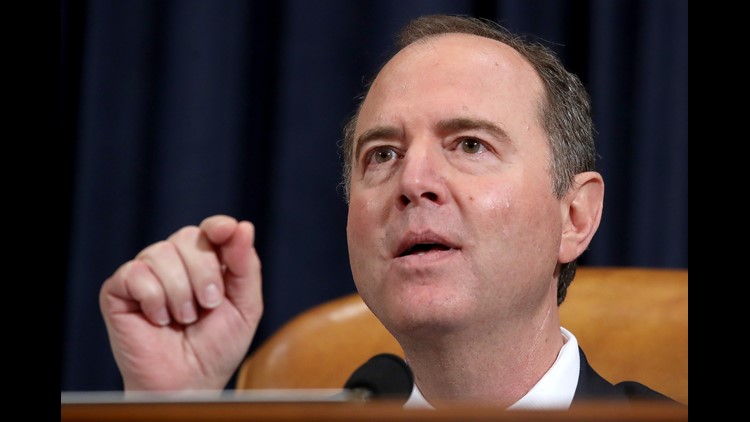As prepared for delivery:
Yesterday morning, the Committee heard from Ambassador Gordon Sondland, the American Ambassador to the European Union, the de facto leader of the “Three Amigos,” who had regular access to President Donald Trump and pressed the new Ukrainian president, Volodymyr Zelensky, for two investigations Trump believed would help his reelection campaign.
The first investigation was of a discredited conspiracy theory that Ukraine and not Russia was responsible for interfering in our 2016 election. The second investigation was into the political rival Trump apparently feared most, Joe Biden.
Trump sought to weaken Biden, and to refute the fact that his own election had been helped by a Russian hacking and dumping operation and Russian social media campaign directed by Vladimir Putin.
Trump’s scheme stood in contrast to the longstanding bipartisan foreign policy of the United States by undermining military and diplomatic support for a key ally, and set back U.S. anticorruption efforts in Ukraine. In conditioning a meeting with Zelensky and then military aid on securing an investigation of his rival, Trump put his personal and political interests above those of the United States. As Ambassador Sondland would later tell career Foreign Service Officer David Holmes immediately after speaking to the President, Trump “did not give a [expletive]” about Ukraine. He cares about “‘big stuff'” that benefits him “like the ‘Biden investigation’ that Giuliani was pushing.”
David Holmes is here with us today. He is a Foreign Service Officer currently serving as the Political Counselor at the U.S. Embassy in Kyiv. Also with us is Dr. Fiona Hill, whose job as the National Security Council’s Senior Director for European and Russian Affairs encompassed the coordination of U.S. policy towards Ukraine. Dr. Hill left the NSC in July, after more than two years in that position. Dr. Hill and Mr. Holmes each provide a unique perspective on issues relating to Ukraine—Dr. Hill from Washington, D.C., and Mr. Holmes from on the ground in Kyiv.
In early 2019, Dr. Hill became concerned by the increasing prominence of Rudy Giuliani, the President’s personal lawyer, who was, as she has testified, “asserting quite frequently on television in public appearances that he had been given some authority over matters related to Ukraine.” Hill was not alone in her concerns. Her boss, National Security Advisor John Bolton, was also paying attention, as were other NSC and State Department officials, including Holmes at the U.S. Embassy in Kyiv.
Bolton viewed Giuliani as “a hand grenade that is going to blow everybody up,” and was powerless to prevent the former mayor from engineering former U.S. Ambassador to Ukraine Marie Yovanovitch’s firing in late April. Holmes, was stunned by “the intensity and consistency of the media attacks” on Yovanovitch “by name as a U.S. Ambassador and the scope of the allegations that were leveled against her.”
Yovanovitch’s dismissal as a result of Giuliani’s smear campaign was one of several things that unsettled Dr. Hill. Another was the role of Gordon Sondland, who emerged as a key player in Ukraine policy in May when he was named as part of the U.S. delegation led by Secretary Rick Perry to President Zelensky’s inauguration. Lt. Col. Alexander Vindman also attended the inauguration and, as Holmes recalls, during a meeting with President Zelensky, took the opportunity to advise the new Ukrainian leader to stay out of U.S. domestic politics.
Another concern that arose for Dr. Hill around this time was her discovery of a potential NSC back channel on Ukraine. Hill learned that an NSC staff member who did not work on Ukraine or for her may have been providing Ukraine-related information to President Trump that Dr. Hill was not made aware of.
According to Holmes, following the Zelensky inauguration, Sondland and Perry took “a very active and unconventional role in formulating our priorities for the new Zelensky administration and personally reaching out to President Zelensky and his senior team.”
Sondland’s newfound assertiveness also concerned Dr. Hill, who previously had enjoyed a cordial working relationship with the ambassador. On June 18, 2019, Hill “had a blow-up” with Sondland when he told her that he was in charge of Ukraine policy. Dr. Hill testified that Sondland “got testy with me. And I said, ‘who has put you in charge of it?’… He said: ‘The President.'”
On July 10th, Dr. Hill was part of a meeting at the White House with a group of U.S. and Ukrainian officials, including Bolton, Sondland, and Energy Secretary Perry, another of the Three Amigos. The meeting was intended, among other things, to give the Ukrainians an opportunity to convey that they “were very anxious to set up a meeting, a first meeting” between their new president and President Trump. Sondland interjected to inform the group that, according to acting White House Chief of Staff Mick Mulvaney, the White House meeting sought by the Ukrainian president with Trump would happen if Ukraine undertook certain investigations. Hearing this, Bolton abruptly ended the meeting.
Undeterred, Sondland brought the Ukrainian delegation and the NSC Director for Ukraine, Lt. Colonel Alexander Vindman, downstairs to another part of the White House, where they were later joined by Dr. Hill. In this second meeting, Sondland was more explicit: Ukraine needed to conduct investigations if they were to get a meeting at all.
Bolton directed Dr. Hill to report this to NSC legal advisor, John Eisenberg, telling her, “You go and tell Eisenberg that I am not part of whatever drug deal Sondland and Mulvaney are cooking up on this, and you go ahead and tell him what you’ve heard and what I’ve said.” Dr. Hill did so, as did Lt. Col. Vindman, who separately approached the same lawyers with his concerns.
On July 18, the day before Dr. Hill left her post at the NSC, Holmes participated in a secure interagency videoconference on Ukraine. Towards the end of the meeting, a representative from the Office of Management and Budget announced that the flow of nearly $400 million in security assistance for Ukraine was being held up. “The order had come from the President and had been conveyed to OMB by” Acting White House Chief of Staff Mick Mulvaney “without further explanation.”
Holmes, unaware of the hold prior to the call, was “shocked.” He thought the suspension of aid was “extremely significant,” undermining what he had understood to be longstanding U.S. national security goals in Ukraine.
One week later, on July 25th, President Trump spoke with President Zelensky by phone. When President Zelensky brought up U.S. military support and noted that Ukraine would like to buy more Javelin anti-tank missiles from the United States, Trump responded by saying, “I would like you to do us a favor, though.”
Trump then requested that Zelensky investigate the discredited conspiracy theory that Ukraine interfered in the 2016 U.S. election. Even more ominously, Trump asked Zelensky to look into the Bidens. Neither request had been included the official talking points for the call prepared by the NSC staff, but both were in Donald Trump’s personal interest, and in the interests of his 2020 re-election campaign. And the Ukrainian president knew about both in advance, in part because of efforts by Ambassadors Sondland and Volker to make him aware of President Trump’s demands.
The next day, July 26, in Kyiv, Holmes served as a note-taker during a meeting between acting Ambassador Bill Taylor, Volker, and Sondland with President Zelensky and other senior Ukrainian officials. Zelensky said that on the previous day’s call, President Trump “had ‘three times raised’ some very sensitive issues and that he would have to follow up on those issues when they met ‘in person.” Although he did not realize it at the time, Holmes came to understand that the “sensitive issues” were the investigations that President Trump demanded on the July 25th call.
Following the meeting with Zelensky, Holmes accompanied Sondland to a separate meeting with one of the Ukrainian president’s top advisors, Andriy Yermak. But Holmes was not allowed into the meeting and waited for thirty minutes while Sondland and the Ukrainian met alone — without any note-takers to record what was said.
After the meeting, Sondland, Holmes and two other State Department staff went to lunch at a nearby restaurant and sat on an outdoor terrace. At some point during the meal, Sondland pulled out his cell phone, placed a call to the White House, and asked to be connected to the President.
When Trump came on the line, Holmes could hear the President’s voice clearly. Holmes recalled that “the President’s voice was very loud and recognizable, and Ambassador Sondland held the phone away from his ear for a period of time, presumably because of the loud volume.”
Sondland said he was calling from Kyiv. He told the President “that President Zelensky ‘loves your ass.'” Holmes then heard President Trump ask, ‘So he’s going to do the investigation?’ Ambassador Sondland replied that ‘he’s going to do it,’ adding that President Zelensky will, ‘do anything you ask him to.’ ”
After the call ended, Holmes “took the opportunity to ask Ambassador Sondland for his candid impression of the President’s views on Ukraine.” It was at this point that Sondland revealed that President Trump “doesn’t give a [expletive] about Ukraine”. “The President only cares about ‘big stuff’ … that benefits the President, like the ‘Biden investigation’ that Mr. Giuliani was pushing.”
A month later, National Security Advisor Bolton travelled to Kyiv. Between meetings with Ukrainian government officials, Holmes heard Bolton express to Ambassador Bill Taylor “his frustration about Mr. Giuliani’s influence with the President.” Bolton made clear, however, that “there was nothing he could do about it.” Bolton further stated that “the hold on security assistance would not be lifted” prior to an upcoming meeting between Trump and Zelensky in Warsaw, where it “would hang on whether President Zelensky was able to ‘favorably impress’ President Trump.”
Trump canceled his trip to Warsaw, but Sondland, Volker and others continued to press for a public announcement of the opening of investigations by Zelensky. On September 8, Taylor told Holmes that “‘now they’re insisting Zelensky commit to the investigation in an interview with CNN.” Holmes was “surprised the requirement was so specific and concrete,” since it amounted to nothing less than a “demand that President Zelensky personally commit to a specific investigation of President Trump’s political rival on a cable news channel.”
On September 9, this Committee — along with the Foreign Affairs and Oversight committees — launched our investigation of this corrupt scheme. President Trump released the hold on aid two days later. As CNN’s Fareed Zakaria has revealed, the Ukrainians cancelled the CNN interview shortly thereafter.
Two weeks later, on September 25, the transcript of the July 25th call was released by the White House, and the details of the President’s scheme started coming into view.
In the coming days, Congress will determine what response is appropriate. If the President abused his power and invited foreign interference in our elections, if he sought to condition, coerce, extort, or bribe a vulnerable ally into conducting investigations to aid his reelection campaign and did so by withholding official acts — a White House meeting or hundreds of millions of dollars of needed military aid — it will be up to us to decide, whether those acts are compatible with the office of the Presidency.



